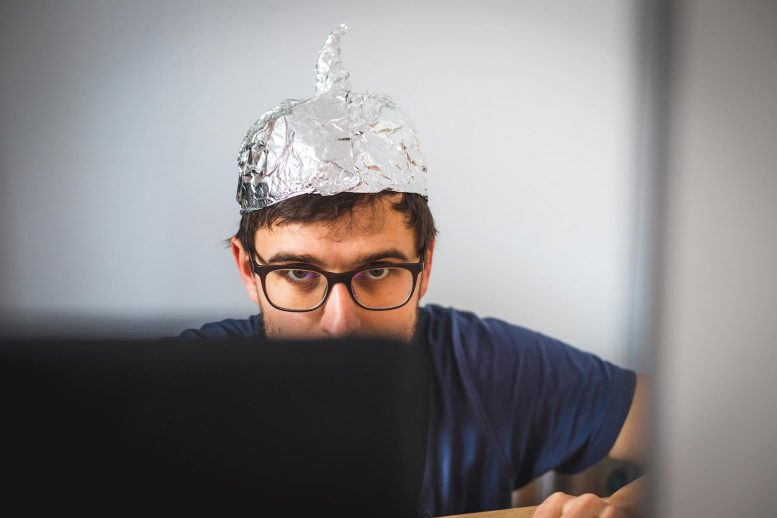
A new study demonstrates that conspiracy theories can influence us even without our belief in them. Merely being exposed to these theories is enough to have an impact.
Not least because of the COVID-19 pandemic, conspiracy theories are more topical than ever. They are reported and discussed in almost all media and communication channels. But what influence do they have on our behavior? Scientists led by behavioral economist Loukas Balafoutas investigated this question in a recently published study. The result: We don’t need to believe in conspiracy theories for them to have an impact on us. Merely being confronted with them suffices.
Previous studies have shown that beliefs in conspiracy theories have an influence on the behavior of their adherents. For example, they lead to lower voter turnout or a lower willingness to get vaccinated.
For years now, conspiracy theories have been experiencing a real boom — it is almost impossible to ignore them. This has prompted a research team led by Loukas Balafoutas to conduct a laboratory experiment to investigate whether conspiracy theories also have an impact on us when we do not believe in them and are only briefly confronted with them.
“Our study shows that subjects who were exposed to a conspiracy theory for just three minutes acted differently in a subsequent behavioral experiment than subjects from the control group,” reports Loukas Balafoutas, Professor of Experimental Economics at the Department of Finance at the University of Innsbruck. The researchers were recently able to publish these results in the journal Economic and Political Studies.
Conspiracy theories change behavior
In the so-called EconLab of the University of Innsbruck, the researchers conducted their experiment before the COVID-19 pandemic. Half of the 144 participants in the study were shown a 3-minute video depicting the 1969 moon landing as a fake. The control group, on the other hand, watched an equally long video about the space shuttle program. Subsequently, the test persons participated in the so-called “money request game.” The players were divided into pairs and asked to make a simultaneous integer bid between 5 and 14 euros. Whoever made the smaller bid received the amount of that bid plus 10 euros; whoever made the larger bid received only the amount of the bid. In the event of a tie, both participants received exactly their bid. In this game, the best response to a bid larger than 5 euros from the other participant is to bid exactly one euro less. If the other participant bids 5 euros, the best response is to bid 14 euros.

Loukas Balafoutas is Professor of Experimental Economics at the Department of Public Finance. Credit: Axel Springer
“In this experiment, we found that subjects who had previously watched the conspiracy theory video bid smaller amounts. This shows that these test persons act more strategically. On the one hand, this can possibly lead to a higher profit in the game, but at the same time this approach also carries the risk of incurring a loss,” explains Balafoutas. “So our aim here is not to evaluate this behavior as better or worse, but simply to show that people who were exposed to a conspiracy theory shortly beforehand display different behavior than the control group in a subsequent situation that is completely different in terms of content. From this we conclude that the conspiracy theory has an influence on how someone perceives the world and other people,” Balafoutas continues.
Trust remains
In another experiment, the so-called “trust game,” the researchers tested the extent to which exposure to a conspiracy theory leads to an impairment of trust toward others. In this game, players were divided into pairs. In each pair, both players received 5 euros. One of the players (A) could decide to invest part or all of the amount. The invested amount was tripled and given to the other player (B), who could then transfer part of the money back to player A — but did not have to. Larger amounts invested by A in this game correspond to a higher level of trust. “It is quite a positive message that we did not find any negative influence of the conspiracy theory here. Trust in the other person was statistically the same in both groups. That’s important because in our society we need a certain level of trust for it to function at all,” Balafoutas says.
That the scientists studied conspiracy theories in the lab is no coincidence. “As researchers, we don’t want to contribute to spreading conspiracy theories into society. Therefore, caution is always required in such studies. They must be carried out in an ethically justifiable manner and must also be approved in advance. It is particularly important to debrief the test subjects after such an experiment,” explains Loukas Balafoutas.
Reference: “Exposure to conspiracy theories in the lab” by Loukas Balafoutas, Alexander Libman, Vasileios Selamis and Björn Vollan, 11 February 2021, Economic and Political Studies.
DOI: 10.1080/20954816.2020.1818930









…”For example, they lead to lower voter turnout or a lower willingness to get vaccinated.”
*…they lead to lower voter turnout- or one might be concerned to its health over right to vote, and out weight the benefits of both…
*…lower willingness to get vaccinated- or one needs an excuse for something that it was already decided and excuse only needed…
… in short one could try to eliminate any alternative opinion that is not in line with a person who wants to make other people just do what they want them to do…
… deescalation of situation is achieved through consideration and availability of different strategies, not buy cutting all possible choices and presenting just one thing as a right choice. Having more different types of vaccines might be preferable outcome, too,
Or some novel technologies that will replace the vaccine, for an example would be acceptable, but just two of many possible ones…<in here there is no consideration of not taking vaccine it is just a way to say that humankind should be doing more than just vaccines…
Here are a few Conspiracy Theories that need to be shot down ASAP!
1) We need a vaccine to stop a plague that spares 99.7% of its victims.
2) Masks are useful in a viral epidemic.
3) Lockdowns stop Covid.
xABBAAA sorry to say this but, everything you’ve written here is nonsensical. Such as, “deescalation of situation is achieved through consideration and availability of different strategies, not buy cutting all possible choices and presenting just one thing as a right choice.”
So if I tell a pregnant woman to stop smoking crack because it is harming her unborn child & her response is, “No! Crack is good for my unborn baby! You’re just brainwashed by media, doctors, elite Academia, Bill Gates & their liberal anti-crack agenda!” You think her unwillingness to put down the pipe is my fault? I should present her with other options or invent some magic technology that keep keeps the crack she smokes from reaching the baby so she’ll do the right thing?
Sorry, but could it be, there are situations where what you have or must do are black and white. If doctors invented some anti covid machine that zapped people into immunity like a vaccine tomorrow….Do you honestly think the same people that don’t believe in vaccines, won’t listen to doctors, refuse to accept reality, who act irresponsibly, reject science, etcetera would line up willingly for the treatment? Don’t be daft!
Sorry bud, sometimes there is only one choice that’s the right answer. That’s how things like SAT test questions or smoking crack when you’re pregnant work. Get vaccinated!! Or like a mother on crack you’ll keep hurting innocent people!!
… if you take xABBAAA to rgb calculator you would figure out that there is way more colors than black and white… for a game of chess it could be enough but compared to real life…
… not against vaccines, but there should be more choices and options, the situation would not be so serious the way it is… sorry some buds never bloom, because they are cut down, like the dinosaur era,…
… regarding people taking Crack, I don’t know, that is not my field of expertise…
… daft? by considering more options,,, wrong way to put the observation stand point, I don’t like to look at the picture from one standing point, I like to consider more technologies, not just two always…
… an Ancor can, though if you are miss informed…